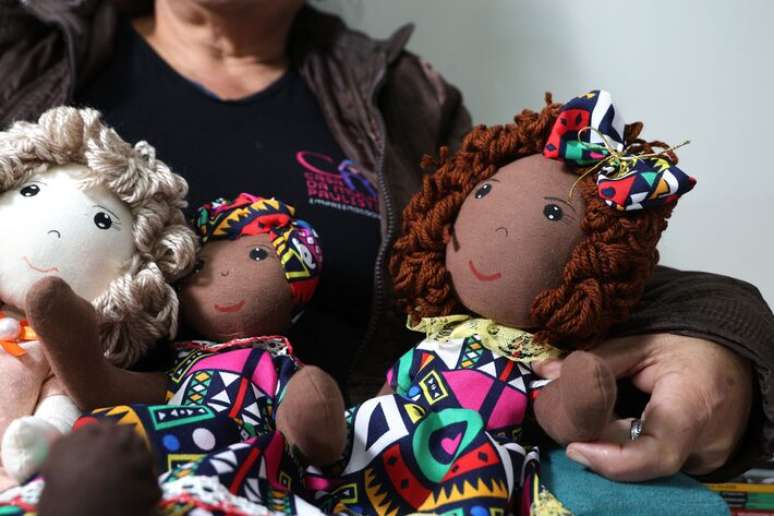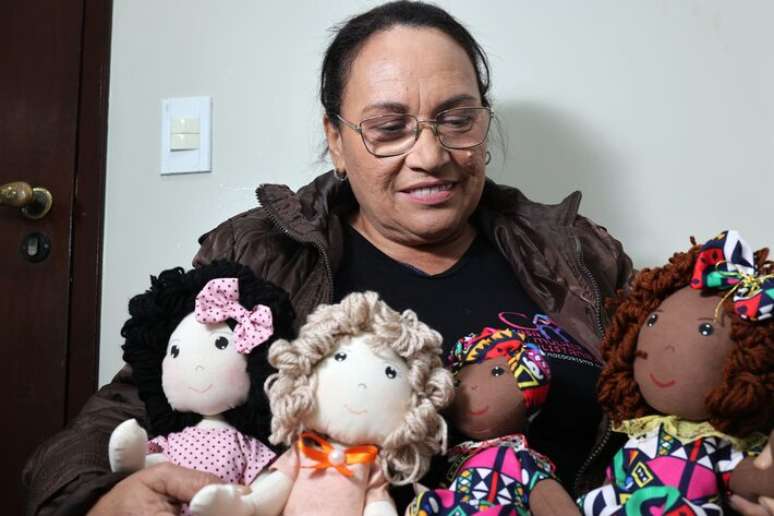Invoicing, guilt and lack of remuneration can generate suffering; support from other women and specialized support help overcome isolation
The handmade dolls of Quitéria Isidoro Carmo, 60 years old, materialize the process of rebuilding self-esteem after overcoming moments of pain and loneliness. The woman from Alagoas works as a crafts teacher at the Casa da Mulher Paulistana, a space of support and empowerment. The professional welcomes housewives in vulnerable situations who arrive at the Jardim São Bernardo NGO on a daily basis, in Saint Paul.
At the age of 20, Quitéria moved from Alagoas to the capital São Paulo, where he worked as an assistant in a school for more than three decades. The artist retired at the age of 52, motivated by the desire to make up for lost time with her children, but, staying at home full time, she felt increasing tiredness and noticed a lack of happiness.
“I had to take care of the house, the kitchen, the children and my husband. Being trapped sucked me in. I did the housework a thousand times. It was never enough. The work never got done,” she recalls.
The “invisible loneliness” experienced by Quitéria is the reality of many Brazilian housewives. The feeling is complex, as it refers not to physical isolation, but to emotional and spiritual isolation. The woman feels the erasure of her identity and the lack of recognition of domestic work.
“An absence of being due to the constant presence of the other, who always needs to be cared for. The other is a priority. It is solitude of oneself, of an identity, of one’s achievements and of one’s own choices”, defines the executive director of the Regional Council of Psychology from Sao Paulo (CRP-SP), Talita Fabiano de Carvalho.
Different loads
Housewives are constantly held responsible for the well-being of children, the elderly and people with disabilities, as well as household chores. This service, however, is usually not valued as work because it does not involve any remuneration, explains Talita.
This burden is not the same for everyone, underlines Helena Hirata, researcher in the sociology of work and gender. “Women with high purchasing power can count on the help of nannies, domestic workers and long-term care institutions for the elderly“, he emphasizes.
It is also necessary to distinguish between scenarios of choice and scenarios of obligation, says psychiatrist Rafael Lopes, a specialist in women’s mental health. There are women who choose domestic work and feel satisfaction, he underlines.
“When it is an obligation, without other options, the risk of dissatisfaction, illness, imprisonment and loneliness increases. The State and public policies have a fundamental role in ensuring that these women can choose freely, with real opportunities in the job market”, attests the psychiatrist.
Guilt and isolation
Even in cases where domestic work is a choice and there is help, it is possible that the woman realizes that she is not well and needs support to deal with the problems that afflict her.
Among these problems, psychiatrist Rafael Lopes highlights guilt, which can represent an additional burden, especially in patients with a history of psychiatric disorders. “The perception of guilt tends to be distorted: women believe they are responsible for everything negative that happens, even when this does not correspond to reality. Psychotherapy is essential to deconstruct this sense of guilt.”
Experts also highlight the feeling of isolation. “Many women face barriers to accessing recreational activities and social interactions because they spend most of their time at home, alone,” acknowledges Lopes.
“Most women don’t talk about what they feel. They verbalize facts, express words and talk, but they don’t talk about their feelings,” adds psychologist Talita Fabiano de Carvalho.

Quitéria crafts teacher Isidoro Carmo remembers the feeling of loneliness growing as he tried to hide his children’s anguish. The desire to spare them left the woman from Alagoas “even sadder inside”. “When I was at home, I felt more trapped than when I worked abroad. I didn’t have time,” she says. “Who would take care of the house and the children? I forgot about myself.”
Seek help
The anguish led Quitéria to seek help at the Casa da Mulher Paulistana, in southern São Paulo. The institution offers courses and conferences to strengthen bonds and encourage women’s confidence.
The Chamber has a team of psychologists, social workers and legal advisors. Women treated on the site undergo therapeutic sessions and are monitored for the time necessary to overcome emotional challenges. Support is also offered to children and adolescents. “It makes no sense to limit yourself to assisting the mother if the children are not well,” explains Lúcia Brugnera, founder and president of the NGO.

In addition to psychological treatment, housewives can choose to attend courses aimed at generating income and professionalization for the job market. “The majority choose training,” observes Lúcia. “The training is the icing on the cake. Their self-esteem returns when they leave home, realize they are capable and live with the other participants.”
The doll workshop transformed Quitéria’s life. Throughout the creative process, she rediscovered herself as an artist and was invited to teach craft classes at the NGO, where she encourages students to share their stories. “Women should say what they feel and what they go through. I was very quiet. I was trapped in a bubble, but the dolls opened my mind and heart.”
Source: Terra
Ben Stock is a lifestyle journalist and author at Gossipify. He writes about topics such as health, wellness, travel, food and home decor. He provides practical advice and inspiration to improve well-being, keeps readers up to date with latest lifestyle news and trends, known for his engaging writing style, in-depth analysis and unique perspectives.






-vbbv3xdoe054.jpg)

